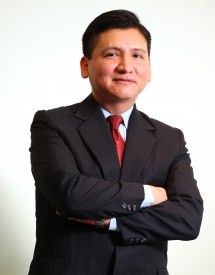Edgar Perez

Author and speaker with expertise in artificial intelligence, cyber security, web3 and the metaverse.
Topic Categories:
Fee Range: Contact Speaker Exchange Agency
- Global quantum computing, artificial intelligence, web3 and the metaverse expert featured on The New York Times, The Wall Street Journal, Bloomberg, CNN, CNBC, FOX Business and CCTV
- Keynote speaker at forums organized by U.S. Securities and Exchange Commission, Council on Foreign Relations, CFA Singapore, Hong Kong Securities Institute, CME Group and Harvard Business School
- Author of “Knightmare on Wall Street” (2013) and “The Speed Traders” (2011), published in English, Chinese and Bahasa Indonesia
- Course director of Quantum Computing, Deep Learning, Cybersecurity and Phishing workshops in the top twenty world capitals
- Top American business, finance and investment writer
*Fee ranges are presented as a guideline only. Speaker fees are subject to change without notice. For an exact quote, please contact your Speaker Exchange Agency representative.
Edgar Perez is one the world’s few business and technology visionaries who can light up a room with insightful and inspiring presentations on the impact of cutting-edge technologies, from 5G to Quantum Computing and from Artificial Intelligence and Cybersecurity to Web3 and the Metaverse. A published author and energetic keynote speaker, he is also an international consultant affiliated with Ponemon Institute, Gerson Lehrman Group and Guidepoint Global Advisors.
Mr. Perez is author of Knightmare on Wall Street, The Rise and Fall of Knight Capital and the Biggest Risk for Financial Markets (2013), and The Speed Traders, An Insider’s Look at the New High-Frequency Trading Phenomenon That is Transforming the Investing World, published in English by McGraw-Hill Inc. (2011), 交易快手, published in Mandarin by China Financial Publishing House (2012), and Investasi Super Kilat, published in Bahasa Indonesia by Kompas Gramedia (2012). He contributes to The New York Times, Sina Finance and CGTN.
Mr. Perez has presented in front of thousands of top executives around the world through keynote speeches and both public and in-house corporate training programs in Beijing, Berlin, Boston, Chicago, Dubai, Hong Kong, Jakarta, Kiev, Kuala Lumpur, Lima, London, Miami, Naples Beach, New York, Santiago, Sao Paulo, Scott Air Force Base, Seoul, Shanghai, Shenzhen, Singapore, Stockholm, Taipei, Warsaw, Washington DC and Zhongshan, among other business metropolises. He has been interviewed on CNN, CGTN, CNBC, FOX Business, Bloomberg TV, BNN Bloomberg, Channel NewsAsia, CNN en Español, Petersburg – Channel 5, Sina Finance, CCTV China, China Radio International, Bankier.pl, TheStreet.com and Leaderonomics.
Mr. Perez has presented for the U.S. Department of Defense, U.S. Securities and Exchange Commission, Council on Foreign Relations, APEC SME Service Alliance, Beijing Municipal People’s Government, China Securities Regulatory Commission, China’s Ministry of Industry and Information Technology, European American Chamber of Commerce, People’s Bank of China, China’ State Administration of Foreign Exchange, Vadym Hetman Kyiv National Economic University, Quant Investment Summit APAC and Fudan University, CFA Singapore, Hong Kong Securities Institute, Courant Institute of Mathematical Sciences at New York University, Hult Business School, Peking University and University of International Business and Economics.
Mr. Perez has spoken at a number of global conferences, including Institutional Investor’s CEO Roundtable (Berlin) and Global Growth Markets Forum (London), Cyber Security World Conference (New York), Inside Market Data (Chicago), Emerging Markets Investments Summit (Warsaw), CME Group‘s Global Financial Leadership Conference (Naples Beach), Harvard Business School‘s Venture Capital & Private Equity Conference (Boston), MIT Sloan Investment Management Conference (Cambridge), Global InsurTech Leaders (Beijing), Fixed Income & FX Leaders Summit APAC and TradeTech Asia (Singapore), FIXGlobal Face2Face (Seoul), and institutional forums organized by Fortune 500 companies.
Mr. Perez was a vice president at Citigroup, a senior consultant at IBM, and a strategy consultant at McKinsey & Co. Mr. Perez has an undergraduate degree in Systems Engineering from Universidad Nacional de Ingeniería, Lima, Peru (1994), a Master of Administration from Universidad ESAN, Lima, Peru (1997) and an MBA from Columbia Business School, New York, majoring in Finance and Management (2002). Mr. Perez is an accomplished salsa and hustle dancer who gladly enjoys dancing with wife Olga, son Edgar Felipe and daughters Svetlana Sofia and Mary Olympia.
The blockchain has been declared as a big revolution in business technology; it is indeed a game-changer for a global financial system that needs an upgrade. A more exciting development has been the booming rise in speculative cryptocurrencies based on blockchain technology, from Bitcoin to Ether. This surge has attracted a new generation of crypto bulls who see these crypto currencies as the cash of the future. Meanwhile, central banks and policymakers around the world explore ways to introduce Central Bank Digital Currencies (CBDCs). If you buy Bitcoin now, Mr. Edgar Perez says, do it at your own peril. Instead, he explains, it is time to explore the future with Ethereum or other platforms that implement smart contracts; ultimately, let’s be prepared to embrace the new realities of CBDCs’ widespread deployment.
Deep learning has enabled many practical applications of artificial intelligence in today’s digital organizations. Deep learning breaks down tasks in ways that makes all kinds of machine aids seem possible, even likely. Driverless cars, better image recognition, more effective medical diagnoses, even better movie recommendations, are all here today. Mr. Edgar Perez will identify what organizations need to do today to embrace the future, starting with the basics: empowering their employees and turbocharging the organization’s digital transformation strategy. Organizations then can then launch pilots for the most promising opportunities, leveraging “state of the art” cases from today’s global innovators such as Google, Facebook, Apple and Tesla. Mr. Perez will show organizations how to kick start their digital impact transformation.
Google recently announced that their most advanced quantum computer, a radically new design to manipulate and process information, has achieved “quantum supremacy” for the first time. The technology giant’s Sycamore quantum processor was able to perform an incredibly complex task in 200 seconds, a feat that would take the world’s fastest supercomputers 10,000 years to complete. The ultimate development and commercialization of this technology will tremendously accelerate difficult tasks across all industries, including financial services, pharmaceuticals, manufacturing and the upcoming space exploration. Are we really there yet? Mr. Edgar Perez will enlighten your audience with the latest head-turning business applications of this revolutionary technology.
Artificial intelligence (AI) has been referred as the general ability of computers to perform tasks commonly associated with intelligent beings. Through a comprehensive review of the latest artificial intelligence breakthroughs, Mr. Edgar Perez will offer his insights on how these advancements will impact businesses and the human race in general for years to come, and more specifically, how companies can leverage the plethora of available resources to start their digital transformation and implement solutions to formerly intractable problems. Mr. Perez will reveal why AI is the present and the future.
Only days after the crash of Ethiopian Airlines Flight 302, the U.S. FAA grounded the Boeing 737 Max 8, joining airlines and governments worldwide in an effort to guarantee passenger safety, just months after the crash of Lion Air Flight 610 involved the same model. Reports point to Boeing’s new automated flight-control system, known as MCAS, as the culprit. However, an initial review of the design, certification and deployment process for the 737 MAX shows an over-reliance on untested technology, potential conflicts of interest between regulators and airlines, and lack of proper documentation and training. Is it still safe to fly? Mr. Edgar Perez will provide an insider’s look at how this dysfunctional process evolved, resulting in 346 casualties within five months, and what your organization can do to identify technology and operational challenges that can compromise its viability.
Neuromorphic Computing (NC) emulates the human brain’s neural structure and operation as it attempts to match a human’s flexibility and ability to learn from unstructured stimuli with the energy efficiency displayed by our brain. NC has grown at the intersection of diverse research disciplines, including computational neuroscience, machine learning, microelectronics, and computer architecture, among others. It seeks to produce a cognition machine that not just reaches decisions, but memorizes information and even deduces facts. Mr. Edgar Perez will enthrall your audience with the possibilities created by computers that will behave as though they were originally engineered for the tasks they are executing, rather than as general-purpose computers taking their instructions from electronic programs.
Classical computing was invented in the 1940s; the advent of Quantum Computing (QC) will make these computers look painfully slow. Calculations that would take longer than a human’s life span to work out on a classic computer can be completed in a matter of hours or minutes with QC. Furthermore, QC will enable solving a set of problems that couldn’t be solved before. QC’s benefits include efficiently simulating new drug molecules and dramatically reducing the time complex financial calculations take, among many others. For optimization, sampling or search problems, this promises dramatic speedups. Mr. Edgar Perez will entertain your audience while revealing why Quantum Computing will disrupt companies in every industry.
An email embedded with malware. Security systems hacked by thieves. Credit card numbers stolen from store purchases. There’s certainly no shortage of examples when it comes to data security breaches and the havoc they wreak on business. No wonder then that nearly a third of CEOs in KPMG’s latest global survey identified cyber security as the issue having the biggest impact on their companies today. Every organization should apply a Cybersecurity Framework for analyzing cyber security, and ideally it should be integrated into an organization’s existing enterprise risk framework. The most innovative companies today have recognized that cyber security is a customer experience and revenue opportunity, not just a risk that needs to be managed. Mr. Edgar Perez will explain why this must be done across the entire organization and why the CEO and Board of Directors have the most important role to play.
The Internet of Things (IoT) explosion will see 75 billion connected devices deployed by 2025. The volumes of data generated will become a tsunami that firms will need to digitalize. Unfortunately, most firms only look at the easy information they can get from structured data while ignoring their unstructured data, which accounts for 90 percent of content generated globally, making unstructured data a tremendous source of untapped value. Artificial Intelligence is making it possible and affordable to sift through and find digital meaning in vast amounts of unstructured data obtained from video, audio, emails, logs, social media posts and IoT devices. All of this data can bring about enormous benefits; Mr. Edgar Perez will show organizations how to reap these benefits today.
Regulatory changes and technological evolution have transformed the financial landscape. Regulators around the world are now in a race to respond to the evolution of technology in financial markets and prevent its operational challenges from becoming the biggest risk for financial markets. However, when considering technology and the cyber landscape, errors are bound to happen. Financial services firms are expected to have deployed the most sophisticated defense systems against cyberattacks. Most of them would realize the need of these investments and implement them, but their IT departments would soon hit a wall. What would it take to limit the impact of the biggest risk for financial markets?
Social engineering involves tricking your employees into breaching security protocols or giving away information. Social engineering exploits human weaknesses rather than technology, preying upon people’s propensity towards trust. Often, these exploits are used to gather information to support a more targeted cyberattack, with the initial forays based on the premise of ‘little and often’ so as not to cause concern. Employees at all levels, including senior executives, are vulnerable. Mr. Edgar Perez will explain why by improving employee awareness and introducing simple technical measures, organizations can improve their protection against social engineering techniques and the risk of a cyberattack.
The Cybersecurity Framework drafted by the U.S. National Institute of Standards and Technology comprises leading practices from various standards bodies that have proved to be successful when implemented; it also may deliver regulatory and legal advantages that extend well beyond improved cybersecurity for organizations. Its adoption may prove advantageous for businesses across virtually all industries. Mr. Edgar Perez will explain why a proper Cybersecurity Program will build on the analysis of possible areas of concern, an understanding of the firm’s most critical assets, and a thorough review of Information Technology’s policies and procedures when faced with rampant cybercrime.
Artificial intelligence (AI) has come a long way since its inception in the mid-20th century. One of the most exciting and promising developments is Generative AI, a rapidly evolving field that focuses on teaching computers to create original content such as music, images, text, video, or protein structures. Unlike traditional AI, where the focus is on classification, prediction, and optimization, Generative AI aims to enable machines to learn from patterns in data and then use that knowledge to create something entirely new. The applications of Generative AI are vast and far-reaching, and its potential to revolutionize industries such as life sciences, fashion, design, healthcare, journalism, and music is significant. Mr. Perez will inspire your team as he explores a future that we can experience today.
ChatGPT is an artificial intelligence language model designed to understand natural language and respond to user queries, providing human-like conversation in text form. ChatGPT can be used to automate customer service, answer frequently asked questions, and gain insights from customer interactions; it can also be used to analyze large amounts of data and generate reports. While ChatGPT is a machine, it was created by humans, and it has important implications for the relationship between humans and machines. Mr. Perez will explore the ways in which ChatGPT blurs the line between human and machine, and what that means for the future of work and our relationship with technology.
The Metaverse is where our digital and physical lives will converge. It will include a virtual world interoperating with the physical world where we live, and generate a robust economy that spans entertainment, commerce, education and work, while transforming long-standing industries such as finance, retail, healthcare fitness, and more. Today, every major company is staking a claim on the Metaverse, from social media giants Meta (formerly Facebook) and Snap to gaming powerhouses Tencent, Microsoft and Epic Games, to hardware providers Nvidia and TSMC. Embrace the possibilities the Metaverse will bring to your organization during this fascinating session with Mr. Edgar Perez.
Web3 promises a better internet built on the blockchain, the distributed ledger systems that form the basis of cryptocurrencies. Backers promise it will cut out traditional middlemen, letting users transact directly and have a greater stake in the applications they use. Facebook, LinkedIn, Instagram and Twitter, for example, make their money through advertising; yet, they share zero of it. Users are supposed to be happy with likes! If the sirens’ songs are to be believed, Web3 will bring more power into the hands of end users. Some people have different views though. Is Web3 just really a land grab underway by already powerful people? Is it a dystopian vision of a pay-to-play internet? Is Web3 ultimately a mere rebranding of crypto with the aim of convincing people that blockchains are the natural next phase of computing? Mr. Perez will inspire you as he cuts to the Web3 chase.
The Metaverse is the next iteration of the Internet. It will transform long-standing industries such as finance, retail, manufacturing, healthcare fitness, and much more. However, the array of technologies that will enable the Metaverse, including VR, AR, 5G, and AI, raise issues of privacy and data security. In immersive worlds, these technologies will siphon up data at an increasingly granular level, a person’s gait, eye movements, emotions and more, putting far greater strain on existing safeguards. Mr. Edgar Perez will review the strategies companies and governments will develop to welcome the Metaverse-shaped data economy.
Artificial intelligence is the capability of a machine to imitate intelligent human behavior, making them act or respond in ways that are similar to humans, such as recognizing faces, understanding language, or playing games. Artificial intelligence is not only transforming how we work, communicate, and learn, but also how we create and consume content. Mr. Perez shares his insights on how AI-generated content is reshaping the fields of art, entertainment, education, journalism, and marketing. He also discusses how we can leverage AI-generated content to unleash our own creativity and innovation.
AI-generated content is content created by an Artificial Intelligence system; it is becoming increasingly popular as a way to quickly and efficiently create content, freeing up time and resources for other tasks. Mr. Perez explores the current state and future potential of artificial intelligence-generated content, such as text, images, music, and videos. He explains how AI-generated content can enhance creativity, productivity, and innovation, as well as the ethical and social challenges it poses for human creators, consumers, and regulators.
What if you could create any content you want with the help of artificial intelligence? What if you could access unlimited sources of information, entertainment, and inspiration from AI-generated content? What if you could collaborate with AI agents to produce novel and original content? These are some of the questions that Mr. Perez addresses in this talk. He reveals how AI-generated content will revolutionize our culture, economy, and society.
Artificial intelligence is a set of technologies that enable computers to perform a variety of advanced functions, including the ability to see, understand and translate spoken and written language, analyze data, make recommendations, and more. Artificial intelligence is now becoming capable of generating high-quality content across various domains and formats. This has profound implications for content creators, consumers, and distributors. Mr. Perez examines the opportunities and risks of AI-generated content. He offers practical recommendations on how to use AI-generated content effectively and responsibly.
Artificial Intelligence-generated content is content that is influenced or enhanced by artificial intelligence, such as text, images, or videos, that incorporates elements of creativity, personalization, or optimization. It can be considered a double-edged sword. On one hand, it can provide us with endless possibilities for expression, communication, and education. On the other hand, it can also pose serious threats to our authenticity, credibility, and security. Mr. Perez explores the pros and cons of AI-generated content. He urges us to be aware of the potential benefits and harms of AI-generated content and to take action to ensure its positive impact.
Want to bring Edgar Perez to your next event? Please tell us a little about your event, and we will get back to you shortly!




